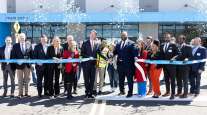Editorial: Surviving the ‘Fiscal Cliff’
The “fiscal cliff” lurks as a major potential danger, and not far down the road. The danger is to us all, in the form of higher taxes, spending cuts in vital areas and what a failure to act might mean to the country’s psyche.
Scott Davis, the chairman and CEO of UPS Inc., said it well last week:
“Regardless of the outcome in November, the U.S. is on the edge of a fiscal cliff, and there is concern whether politicians can reach an agreement that solves these issues. The lack of political will to fix our debt problem adds to uncertainty in our economy — just what we don’t need.”
As part of the budget-war peace treaty — namely the Budget Control Act of 2011 — Congress and the White House agreed on a series of automatic, large program cuts as a prod to force a long-term compromise between the parties.
If no new deal is reached soon, on Dec. 31, the temporary federal payroll tax cut will end, the Bush-era income tax reductions will expire and more than 1,000 government programs will suffer large cuts.
The business community is clearly waking up to the potentially disastrous implications of such an event: cutting spending and raising taxes now is sure to impede the already not-too-robust economic recovery here.
Fiscal woes in Europe are already weighing on the U.S. recovery, and the “fiscal cliff” could send the economy into a tailspin.
UPS’ Davis said, “If solutions are in place to both reduce the deficit and eliminate the threat of a fiscal cliff, the United States will be in a better position for sustained growth.”
UPS has joined about 80 other large U.S. corporations in a group called “Fix the Debt” in an effort to pressure Congress to reduce the deficit with a rational, comprehensive approach.
The group was founded as a bipartisan effort by Republican Alan Simpson and Democrat Erskine Bowles, the two men who headed a federal panel that produced a plan for resolving the nation’s fiscal woes. Both parties ignored the panel’s recommendations.
From ATA’s perspective, our nation’s elected leaders need to act. The winners in November’s elections need to act to solve the looming problems, including the fiscal cliff.
And the losers in November’s contests need to support those who get elected in their efforts.
In the end, the needs of the nation must trump party platforms and political posturing.




